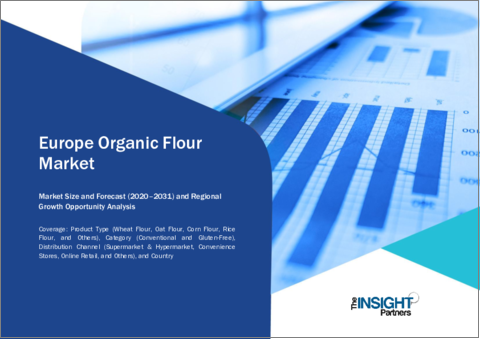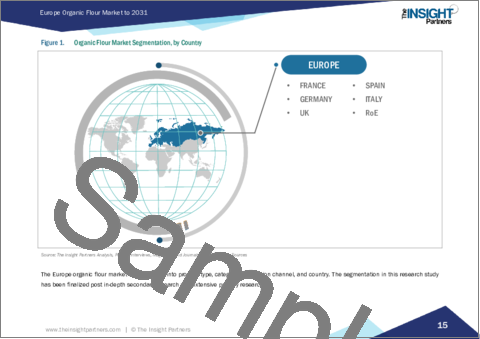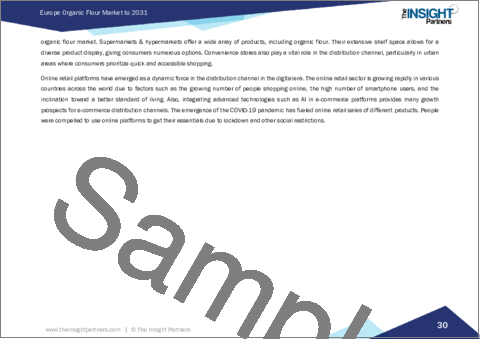|
|
市場調査レポート
商品コード
1597113
欧州の有機小麦粉市場の将来予測 (2031年まで) - 地域別分析:製品種類別、カテゴリー別、流通チャネル別Europe Organic Flour Market Forecast to 2031 - Regional Analysis - by Product Type, Category, and Distribution Channel |
||||||
|
|||||||
| 欧州の有機小麦粉市場の将来予測 (2031年まで) - 地域別分析:製品種類別、カテゴリー別、流通チャネル別 |
|
出版日: 2024年10月03日
発行: The Insight Partners
ページ情報: 英文 107 Pages
納期: 即納可能
|
全表示
- 概要
- 図表
- 目次
欧州の有機小麦粉市場は、2023年に36億7,399万米ドルと評価され、2031年には58億3,525万米ドルに達すると予測され、2023年から2031年までのCAGRは6.0%と推定されます。
主要企業の戦略的取り組みによる欧州の有機小麦粉市場の促進
さまざまな企業が、自社のポジションを強化して新たな機会を活用するために、企業合併・買収 (M&A) や事業提携、キャンペーン開始、製品発売などの戦略的イニシアティブを実施しています。M&Aは、主要企業が市場シェアを強化し、製品ポートフォリオを拡大するために採用する顕著な戦略的イニシアチブです。例えば2020年、ADMは英国を拠点とする有機小麦粉製粉会社Gleadell Agriculture Ltd.の残り50%の株式を取得しました。この買収により、ADMは有機小麦粉市場におけるプレゼンスを拡大し、サプライチェーン能力を強化することができました。事業提携・協力も、有機小麦粉メーカーが補完的な強みとリソースを活用するために採用する重要な戦略です。有機小麦粉メーカーは、小売業者、流通業者、その他の食品業界関係者と提携することで、流通網を強化し、ブランドの認知度を高め、新たな販売チャネルにアクセスすることができます。有機小麦粉の利点について消費者の認識を高め、教育することを目的としたキャンペーンも、市場成長を促進する上で重要な役割を果たしています。主な企業は、有機小麦粉の栄養価の高さ、環境の持続可能性、品質基準を強調するマーケティングキャンペーンに投資することが多いです。こうしたキャンペーンは、需要を喚起し、消費者の嗜好を形成し、有機小麦粉製品を従来の代替品と差別化するのに役立ちます。こうしたキャンペーンには、デジタル広告、ソーシャルメディアプロモーション、教育コンテンツなどが含まれ、製パンや料理に有機小麦粉を使用する利点について消費者の意識を高めます。 有機小麦粉市場の競争力を維持し、消費者の嗜好の変化に対応するためには、製品の発売が不可欠です。主要企業は、特定の食事ニーズ・嗜好・シーンに合わせた有機小麦粉の新製品を継続的に開発・投入しています。例えば、グルテンフリーの有機小麦粉はグルテン不耐症や過敏症の消費者に対応し、アーモンド粉やココナッツ粉などの特殊小麦粉は代替製パン材料を求める健康志向の消費者にアピールします。また、多くの企業が有機小麦粉などの製品を発売し、オーガニック市場に参入しています。このように、主要企業によるM&A、提携、キャンペーン展開、製品発売などの戦略的イニシアチブは、各企業に利益をもたらすとともに、イノベーションの促進、市場リーチの拡大、消費者の意識と満足度の向上を通じて、有機小麦粉業界全体の発展と持続可能性に貢献しています。
欧州の有機小麦粉市場の概要
欧州全域の消費者は、食品の安全性、環境の持続可能性、農業慣行が公衆衛生に与える影響に対する関心を高めています。このため、小麦粉を含む有機製品への嗜好が高まっています。欧州の消費者は、合成農薬、除草剤、遺伝子組み換え作物を使用せずに生産された有機小麦粉を積極的に求め、従来の小麦粉よりもはるかに安全で環境に優しい選択肢と見なしています。有機小麦粉へのシフトは、消費者のライフスタイルや食生活の嗜好の変化にも後押しされており、多くの欧州人がより健康的で自然な食品を選んでいます。欧州では、有機小麦粉を専門に製造するメーカーや生産者の存在感が強いです。英国のShipton Mill、ルクセンブルクのMoulins de Kleinbettingen、ドイツのBio Backhaus Spiegelhauerなどは、高品質の有機小麦粉で知られる欧州メーカーの一例です。これらのメーカーは、地元産の有機穀物や伝統的な製粉技術を重視することが多く、職人的で持続可能な食品製造法を重視する欧州の消費者の嗜好に応えています。同地域には評判の高いメーカーが数多く存在するため、有機小麦粉の選択肢が入手しやすく、製品需要に拍車をかけています。さらに、有機農法を推進する政府の支援や規制が、欧州の有機小麦粉市場を牽引する上で大きな役割を果たしています。例えば、グリーン・ディールのFarm to Fork戦略の下、欧州委員会は「2030年までにEUの農地の少なくとも25%を有機農法で栽培し、有機養殖を大幅に増やす」という目標を掲げています。欧州委員会は、EUの包括的な有機行動計画を策定しました。欧州委員会はこれを通じ、2030年までに農地の25%を有機農業にするという欧州グリーン・ディール目標の達成を目指します。EU有機認証を含むEUの有機農業規制は、有機食品生産の基準とガイドラインを提供し、消費者の透明性と品質保証を確保しています。さらに、有機農家への補助金や研究開発への投資といったイニシアチブは、有機農法の採用にインセンティブを与えています。欧州の有機小麦粉市場の成長は、有機で持続可能な食品に対する消費者の需要の高まり、定評あるメーカーの存在、有機農業を推進する政府の支援政策によってもたらされます。
欧州の有機小麦粉市場の収益と2031年までの予測 (単位:100万米ドル)
欧州の有機小麦粉市場のセグメンテーション
欧州の有機小麦粉市場は、製品種類別・カテゴリー別・流通チャネル別・国別に分類されます。
製品種類別では、欧州の有機小麦粉市場は小麦粉、オート麦粉、トウモロコシ粉、米粉、その他に分類されます。小麦粉セグメントは2023年に最大の市場シェアを占めました。
カテゴリー別では、欧州の有機小麦粉市場は従来型とグルテンフリーに二分されます。2023年にはグルテンフリーのセグメントがより大きな市場シェアを占めました。
流通チャネル別では、欧州の有機小麦粉市場はスーパーマーケット・ハイパーマーケット、コンビニエンスストア、オンライン小売、その他に区分されます。スーパーマーケット・ハイパーマーケット部門が2023年に最大の市場シェアを占めました。
国別では、欧州の有機小麦粉市場はドイツ、英国、フランス、イタリア、スペイン、その他欧州に区分されます。その他欧州が2023年の欧州の有機小麦粉市場シェアを独占しました。
KoRo、FWP Matthews Ltd、Shipton Mill Ltd、W&H Marriage & Sons Ltd、Gilchesters Organicsなどが、欧州の有機小麦粉市場で事業を展開している主要企業です。
目次
第1章 イントロダクション
第2章 エグゼクティブサマリー
第3章 調査手法
第4章 欧州の有機小麦粉市場の情勢
- ポーターのファイブフォース分析
- 供給企業の交渉力
- 買い手の交渉力
- 新規参入業者の脅威
- 競争企業間の敵対関係
- 代替品の脅威
- エコシステム分析
- 原材料サプライヤー
- メーカー
- 流通業者/サプライヤー
- 流通チャネル
第5章 欧州の有機小麦粉市場:主な市場力学
- 市場促進要因
- 有機小麦粉の健康効果に関する意識の高まり
- 主要企業による戦略的取り組み
- 市場抑制要因
- 規制への対応
- 市場機会
- eコマースの普及
- 今後の動向
- グルテンフリー製品の需要急増
- 促進要因と抑制要因の影響
第6章 欧州の有機小麦粉市場の分析
- 欧州の有機小麦粉市場の概要
- 有機小麦粉市場の収益 (2020~2031年)
- 有機小麦粉市場の予測分析
第7章 欧州の有機小麦粉市場の分析:製品種類別
- 小麦粉
- オート麦粉
- トウモロコシ粉
- 米粉
- その他
第8章 欧州の有機小麦粉市場の分析:カテゴリー別
- 従来型
- グルテンフリー
第9章 欧州の有機小麦粉市場の分析:流通チャネル別
- スーパーマーケット・ハイパーマーケット
- コンビニエンスストア
- オンライン小売
- その他
第10章 欧州の有機小麦粉市場:国別分析
- 欧州
- ドイツ
- 英国
- フランス
- イタリア
- スペイン
- その他欧州
第11章 企業プロファイル
- KoRo
- FWP Matthews Ltd
- Shipton Mill Ltd
- W&H Marriage & Sons Ltd
- Gilchesters Organics
第12章 競合情勢
- ヒートマップ分析
- 企業のポジショニングと集中度
第13章 付録
List Of Tables
- Table 1. Organic Flour Market Segmentation
- Table 2. Organic Flour Market - Revenue and Forecast to 2031 (US$ Million)
- Table 3. Organic Flour Market - Revenue and Forecast to 2031 (US$ Million) - by Product Type
- Table 4. Organic Flour Market - Revenue and Forecast to 2031 (US$ Million) - by Category
- Table 5. Organic Flour Market - Revenue and Forecast to 2031 (US$ Million) - by Distribution Channel
- Table 6. Europe: Organic Flour Market - Revenue and Forecast to 2031 (US$ Million) - by Country
- Table 7. Germany: Organic Flour Market - Revenue and Forecast to 2031 (US$ Million) - by Product Type
- Table 8. Germany: Organic Flour Market - Revenue and Forecast to 2031 (US$ Million) - by Category
- Table 9. Germany: Organic Flour Market - Revenue and Forecast to 2031 (US$ Million) - by Distribution Channel
- Table 10. United Kingdom: Organic Flour Market - Revenue and Forecast to 2031 (US$ Million) - by Product Type
- Table 11. United Kingdom: Organic Flour Market - Revenue and Forecast to 2031 (US$ Million) - by Category
- Table 12. United Kingdom: Organic Flour Market - Revenue and Forecast to 2031 (US$ Million) - by Distribution Channel
- Table 13. France: Organic Flour Market - Revenue and Forecast to 2031 (US$ Million) - by Product Type
- Table 14. France: Organic Flour Market - Revenue and Forecast to 2031 (US$ Million) - by Category
- Table 15. France: Organic Flour Market - Revenue and Forecast to 2031 (US$ Million) - by Distribution Channel
- Table 16. Italy: Organic Flour Market - Revenue and Forecast to 2031 (US$ Million) - by Product Type
- Table 17. Italy: Organic Flour Market - Revenue and Forecast to 2031 (US$ Million) - by Category
- Table 18. Italy: Organic Flour Market - Revenue and Forecast to 2031 (US$ Million) - by Distribution Channel
- Table 19. Spain: Organic Flour Market - Revenue and Forecast to 2031 (US$ Million) - by Product Type
- Table 20. Spain: Organic Flour Market - Revenue and Forecast to 2031 (US$ Million) - by Category
- Table 21. Spain: Organic Flour Market - Revenue and Forecast to 2031 (US$ Million) - by Distribution Channel
- Table 22. Rest of Europe: Organic Flour Market - Revenue and Forecast to 2031 (US$ Million) - by Product Type
- Table 23. Rest of Europe: Organic Flour Market - Revenue and Forecast to 2031 (US$ Million) - by Category
- Table 24. Rest of Europe: Organic Flour Market - Revenue and Forecast to 2031 (US$ Million) - by Distribution Channel
- Table 25. Heat Map Analysis
List Of Figures
- Figure 1. Organic Flour Market Segmentation, by Country
- Figure 2. Organic Flour Market - Porters Five Forces Analysis
- Figure 3. Ecosystem: Organic Flour Market
- Figure 4. Organic Flour Market - Key Market Dynamics
- Figure 5. Impact Analysis of Drivers and Restraints
- Figure 6. Organic Flour Market Revenue (US$ Million), 2020-2031
- Figure 7. Organic Flour Market Share (%) - by Product Type (2023 and 2031)
- Figure 8. Wheat Flour: Organic Flour Market - Revenue and Forecast to 2031 (US$ Million)
- Figure 9. Oat Flour: Organic Flour Market - Revenue and Forecast to 2031 (US$ Million)
- Figure 10. Corn Flour: Organic Flour Market - Revenue and Forecast to 2031 (US$ Million)
- Figure 11. Rice Flour: Organic Flour Market - Revenue and Forecast to 2031 (US$ Million)
- Figure 12. Others: Organic Flour Market - Revenue and Forecast to 2031 (US$ Million)
- Figure 13. Organic Flour Market Share (%) - by Category (2023 and 2031)
- Figure 14. Conventional: Organic Flour Market - Revenue and Forecast to 2031 (US$ Million)
- Figure 15. Gluten-Free: Organic Flour Market - Revenue and Forecast to 2031 (US$ Million)
- Figure 16. Organic Flour Market Share (%) - by Distribution Channel (2023 and 2031)
- Figure 17. Supermarket & Hypermarket: Organic Flour Market - Revenue and Forecast to 2031 (US$ Million)
- Figure 18. Convenience Stores: Organic Flour Market - Revenue and Forecast to 2031 (US$ Million)
- Figure 19. Online Retail: Organic Flour Market - Revenue and Forecast to 2031 (US$ Million)
- Figure 20. Others: Organic Flour Market - Revenue and Forecast to 2031 (US$ Million)
- Figure 21. Europe Organic Flour Market, by Key Country - Revenue (2023) (US$ Million)
- Figure 22. Europe: Organic Flour Market Breakdown, by Key Countries, 2023 and 2031 (%)
- Figure 23. Germany: Organic Flour Market - Revenue and Forecast to 2031 (US$ Million)
- Figure 24. United Kingdom: Organic Flour Market - Revenue and Forecast to 2031 (US$ Million)
- Figure 25. France: Organic Flour Market - Revenue and Forecast to 2031 (US$ Million)
- Figure 26. Italy: Organic Flour Market - Revenue and Forecast to 2031 (US$ Million)
- Figure 27. Spain: Organic Flour Market - Revenue and Forecast to 2031 (US$ Million)
- Figure 28. Rest of Europe: Organic Flour Market - Revenue and Forecast to 2031 (US$ Million)
- Figure 29. Company Positioning & Concentration
The Europe organic flour market was valued at US$ 3,673.99 million in 2023 and is expected to reach US$ 5,835.25 million by 2031; it is estimated to register a CAGR of 6.0% from 2023 to 2031.
Strategic Initiatives by Key Players Driver Europe Organic Flour Market
Various industry players have undertaken strategic initiatives such as Mergers and acquisitions, partnerships, campaign launches, and product launches to strengthen their positions and capitalize on emerging opportunities. M&As are prominent strategic initiatives that key players adopt to consolidate market share and expand their product portfolios. For instance, in 2020, ADM acquired the remaining 50% stake in the UK-based organic flour milling company Gleadell Agriculture Ltd. This acquisition enabled ADM to expand its presence in the organic flour market and strengthen its supply chain capabilities. Partnerships and collaborations are another crucial strategy organic flour manufacturers employ to leverage complementary strengths and resources. By partnering with retailers, distributors, or other food industry players, organic flour producers can enhance their distribution networks, increase brand visibility, and access new sales channels. Campaign launches aimed at raising awareness and educating consumers about the benefits of organic flour also play a vital role in driving market growth. Key players often invest in marketing campaigns highlighting organic flour's nutritional advantages, environmental sustainability, and quality standards. These campaigns help create demand, shape consumer preferences, and differentiate organic flour products from conventional alternatives. These campaigns include digital advertising, social media promotions, and educational content to raise consumers' awareness about the advantages of using organic flour in their baking and cooking. Product launches are integral for maintaining competitiveness and meeting evolving consumer preferences in the organic flour market. Key players continuously innovate and introduce new organic flour products tailored to specific dietary needs, taste preferences, and occasions. For instance, gluten-free organic flour variants cater to consumers with gluten intolerance or sensitivity, while specialty flours such as almond flour or coconut flour appeal to health-conscious consumers seeking alternative baking ingredients. Also, many companies are entering the organic market by launching products such as organic flour. Thus, strategic initiatives such as M&As, partnerships, campaign launches, and product launches by key players benefit individual companies and contribute to the overall development and sustainability of the organic flour industry by fostering innovation, expanding market reach, and enhancing consumer awareness and satisfaction.
Europe Organic Flour Market Overview
Consumers across Europe are increasingly concerned about food safety, environmental sustainability, and the impact of agricultural practices on public health. This has led to a growing preference for organic products, including flour. Consumers in Europe actively seek organic flour produced without synthetic pesticides, herbicides, or GMOs, viewing it as a much safer and more environmentally friendly option than conventional flour. This shift toward organic flour is also driven by changing consumer lifestyles and dietary preferences, with many Europeans opting for healthier and more natural food choices. Europe has a strong presence of manufacturers and producers specializing in organic flour production. Companies such as Shipton Mill in the UK, Moulins de Kleinbettingen in Luxembourg, and Bio Backhaus Spiegelhauer in Germany are a few examples of European manufacturers known for their high-quality organic flour offerings. These manufacturers often emphasize using locally sourced organic grains and traditional milling techniques, catering to the preferences of European consumers who value artisanal and sustainable food production methods. The presence of numerous reputable manufacturers in the region contributes to the accessibility and availability of organic flour options, fueling the product demand. Further, government support and regulations promoting organic farming practices have played a major role in driving the organic flour market in Europe. For instance, under the Green Deal's Farm to Fork strategy, the European Commission has set a target of 'at least 25% of the EU's agricultural land under organic farming and a significant increase in organic aquaculture by 2030'. The Commission has set out a comprehensive organic action plan for the European Union. Through it, the Commission will aim to achieve the European Green Deal target of 25% of agricultural land under organic farming by 2030. The European Union's organic farming regulations, including the EU Organic Certification, provide standards and guidelines for organic food production, ensuring consumer transparency and quality assurance. Moreover, initiatives such as subsidies for organic farmers and investments in research and development incentivize the adoption of organic farming methods. The Europe organic flour market growth is driven by rising consumer demand for organic and sustainable food products, the presence of established manufacturers, and supportive government policies promoting organic agriculture.
Europe Organic Flour Market Revenue and Forecast to 2031 (US$ Million)
Europe Organic Flour Market Segmentation
The Europe organic flour market is categorized into product type, category, distribution channel, and country.
Based on product type, the Europe organic flour market is categorized into wheat flour, oat flour, corn flour, rice flour, and others. The wheat flour segment held the largest market share in 2023.
In terms of category, the Europe organic flour market is bifurcated into conventional and gluten-free. The gluten-free segment held a larger market share in 2023.
By distribution channel, the Europe organic flour market is segmented into supermarket & hypermarket, convenience stores, online retail, and others. The supermarket & hypermarket segment held the largest market share in 2023.
By country, the Europe organic flour market is segmented into Germany, the UK, France, Italy, Spain, and the Rest of Europe. The Rest of Europe dominated the Europe organic flour market share in 2023.
KoRo, FWP Matthews Ltd, Shipton Mill Ltd, W&H Marriage & Sons Ltd, and Gilchesters Organics are some of the leading companies operating in the Europe organic flour market.
Table Of Contents
1. Introduction
- 1.1 The Insight Partners Research Report Guidance
- 1.2 Market Segmentation
2. Executive Summary
- 2.1 Key Market Insights
- 2.2 Market Attractiveness
3. Research Methodology
- 3.1 Coverage
- 3.2 Secondary Research
- 3.3 Primary Research
- 3.4 Limitations and Assumptions
4. Europe Organic Flour Market Landscape
- 4.1 Porters Five Forces Analysis
- 4.1.1 Bargaining Power of Suppliers
- 4.1.2 Bargaining Power of Buyers
- 4.1.3 Threat of New Entrants
- 4.1.4 Intensity of Competitive Rivalry
- 4.1.5 Threat of Substitutes
- 4.2 Ecosystem Analysis
- 4.2.1 Raw Material Suppliers
- 4.2.2 Manufacturers
- 4.2.3 Distributors/Suppliers
- 4.2.4 Distribution Channel
5. Europe Organic Flour Market - Key Market Dynamics
- 5.1 Market Drivers
- 5.1.1 Surging Awareness Regarding Health Benefits of Organic Flour
- 5.1.2 Strategic Initiatives by Key Players
- 5.2 Market Restraints
- 5.2.1 Regulatory Compliance
- 5.3 Market Opportunities
- 5.3.1 Proliferation of E-Commerce
- 5.4 Future Trends
- 5.4.1 Surging Demand for Gluten-Free Products
- 5.5 Impact of Drivers and Restraints:
6. Organic Flour Market - Europe Analysis
- 6.1 Europe Organic Flour Market Overview
- 6.2 Organic Flour Market Revenue (US$ Million), 2020-2031
- 6.3 Organic Flour Market Forecast Analysis
7. Europe Organic Flour Market Analysis - by Product Type
- 7.1 Wheat Flour
- 7.1.1 Overview
- 7.1.2 Wheat Flour: Organic Flour Market - Revenue and Forecast to 2031 (US$ Million)
- 7.2 Oat Flour
- 7.2.1 Overview
- 7.2.2 Oat Flour: Organic Flour Market - Revenue and Forecast to 2031 (US$ Million)
- 7.3 Corn Flour
- 7.3.1 Overview
- 7.3.2 Corn Flour: Organic Flour Market - Revenue and Forecast to 2031 (US$ Million)
- 7.4 Rice Flour
- 7.4.1 Overview
- 7.4.2 Rice Flour: Organic Flour Market - Revenue and Forecast to 2031 (US$ Million)
- 7.5 Others
- 7.5.1 Overview
- 7.5.2 Others: Organic Flour Market - Revenue and Forecast to 2031 (US$ Million)
8. Europe Organic Flour Market Analysis - by Category
- 8.1 Conventional
- 8.1.1 Overview
- 8.1.2 Conventional: Organic Flour Market - Revenue and Forecast to 2031 (US$ Million)
- 8.2 Gluten-Free
- 8.2.1 Overview
- 8.2.2 Gluten-Free: Organic Flour Market - Revenue and Forecast to 2031 (US$ Million)
9. Europe Organic Flour Market Analysis - by Distribution Channel
- 9.1 Supermarket & Hypermarket
- 9.1.1 Overview
- 9.1.2 Supermarket & Hypermarket: Organic Flour Market - Revenue and Forecast to 2031 (US$ Million)
- 9.2 Convenience Stores
- 9.2.1 Overview
- 9.2.2 Convenience Stores: Organic Flour Market - Revenue and Forecast to 2031 (US$ Million)
- 9.3 Online Retail
- 9.3.1 Overview
- 9.3.2 Online Retail: Organic Flour Market - Revenue and Forecast to 2031 (US$ Million)
- 9.4 Others
- 9.4.1 Overview
- 9.4.2 Others: Organic Flour Market - Revenue and Forecast to 2031 (US$ Million)
10. Europe Organic Flour Market - Country Analysis
- 10.1 Europe
- 10.1.1 Europe: Organic Flour Market Breakdown, by Key Countries, 2023 and 2031 (%)
- 10.1.1.1 Europe: Organic Flour Market - Revenue and Forecast Analysis - by Country
- 10.1.1.2 Germany: Organic Flour Market - Revenue and Forecast to 2031 (US$ Million)
- 10.1.1.2.1 Germany: Organic Flour Market Breakdown, by Product Type
- 10.1.1.2.2 Germany: Organic Flour Market Breakdown, by Category
- 10.1.1.2.3 Germany: Organic Flour Market Breakdown, by Distribution Channel
- 10.1.1.3 United Kingdom: Organic Flour Market - Revenue and Forecast to 2031 (US$ Million)
- 10.1.1.3.1 United Kingdom: Organic Flour Market Breakdown, by Product Type
- 10.1.1.3.2 United Kingdom: Organic Flour Market Breakdown, by Category
- 10.1.1.3.3 United Kingdom: Organic Flour Market Breakdown, by Distribution Channel
- 10.1.1.4 France: Organic Flour Market - Revenue and Forecast to 2031 (US$ Million)
- 10.1.1.4.1 France: Organic Flour Market Breakdown, by Product Type
- 10.1.1.4.2 France: Organic Flour Market Breakdown, by Category
- 10.1.1.4.3 France: Organic Flour Market Breakdown, by Distribution Channel
- 10.1.1.5 Italy: Organic Flour Market - Revenue and Forecast to 2031 (US$ Million)
- 10.1.1.5.1 Italy: Organic Flour Market Breakdown, by Product Type
- 10.1.1.5.2 Italy: Organic Flour Market Breakdown, by Category
- 10.1.1.5.3 Italy: Organic Flour Market Breakdown, by Distribution Channel
- 10.1.1.6 Spain: Organic Flour Market - Revenue and Forecast to 2031 (US$ Million)
- 10.1.1.6.1 Spain: Organic Flour Market Breakdown, by Product Type
- 10.1.1.6.2 Spain: Organic Flour Market Breakdown, by Category
- 10.1.1.6.3 Spain: Organic Flour Market Breakdown, by Distribution Channel
- 10.1.1.7 Rest of Europe: Organic Flour Market - Revenue and Forecast to 2031 (US$ Million)
- 10.1.1.7.1 Rest of Europe: Organic Flour Market Breakdown, by Product Type
- 10.1.1.7.2 Rest of Europe: Organic Flour Market Breakdown, by Category
- 10.1.1.7.3 Rest of Europe: Organic Flour Market Breakdown, by Distribution Channel
- 10.1.1 Europe: Organic Flour Market Breakdown, by Key Countries, 2023 and 2031 (%)
11. Company Profiles
- 11.1 KoRo
- 11.1.1 Key Facts
- 11.1.2 Business Description
- 11.1.3 Products and Services
- 11.1.4 Financial Overview
- 11.1.5 SWOT Analysis
- 11.1.6 Key Developments
- 11.2 FWP Matthews Ltd
- 11.2.1 Key Facts
- 11.2.2 Business Description
- 11.2.3 Products and Services
- 11.2.4 Financial Overview
- 11.2.5 SWOT Analysis
- 11.2.6 Key Developments
- 11.3 Shipton Mill Ltd
- 11.3.1 Key Facts
- 11.3.2 Business Description
- 11.3.3 Products and Services
- 11.3.4 Financial Overview
- 11.3.5 SWOT Analysis
- 11.3.6 Key Developments
- 11.4 W&H Marriage & Sons Ltd
- 11.4.1 Key Facts
- 11.4.2 Business Description
- 11.4.3 Products and Services
- 11.4.4 Financial Overview
- 11.4.5 SWOT Analysis
- 11.4.6 Key Developments
- 11.5 Gilchesters Organics
- 11.5.1 Key Facts
- 11.5.2 Business Description
- 11.5.3 Products and Services
- 11.5.4 Financial Overview
- 11.5.5 SWOT Analysis
- 11.5.6 Key Developments
12. Competitive Landscape
- 12.1 Heat Map Analysis
- 12.2 Company Positioning & Concentration
13. Appendix
- 13.1 About The Insight Partners






